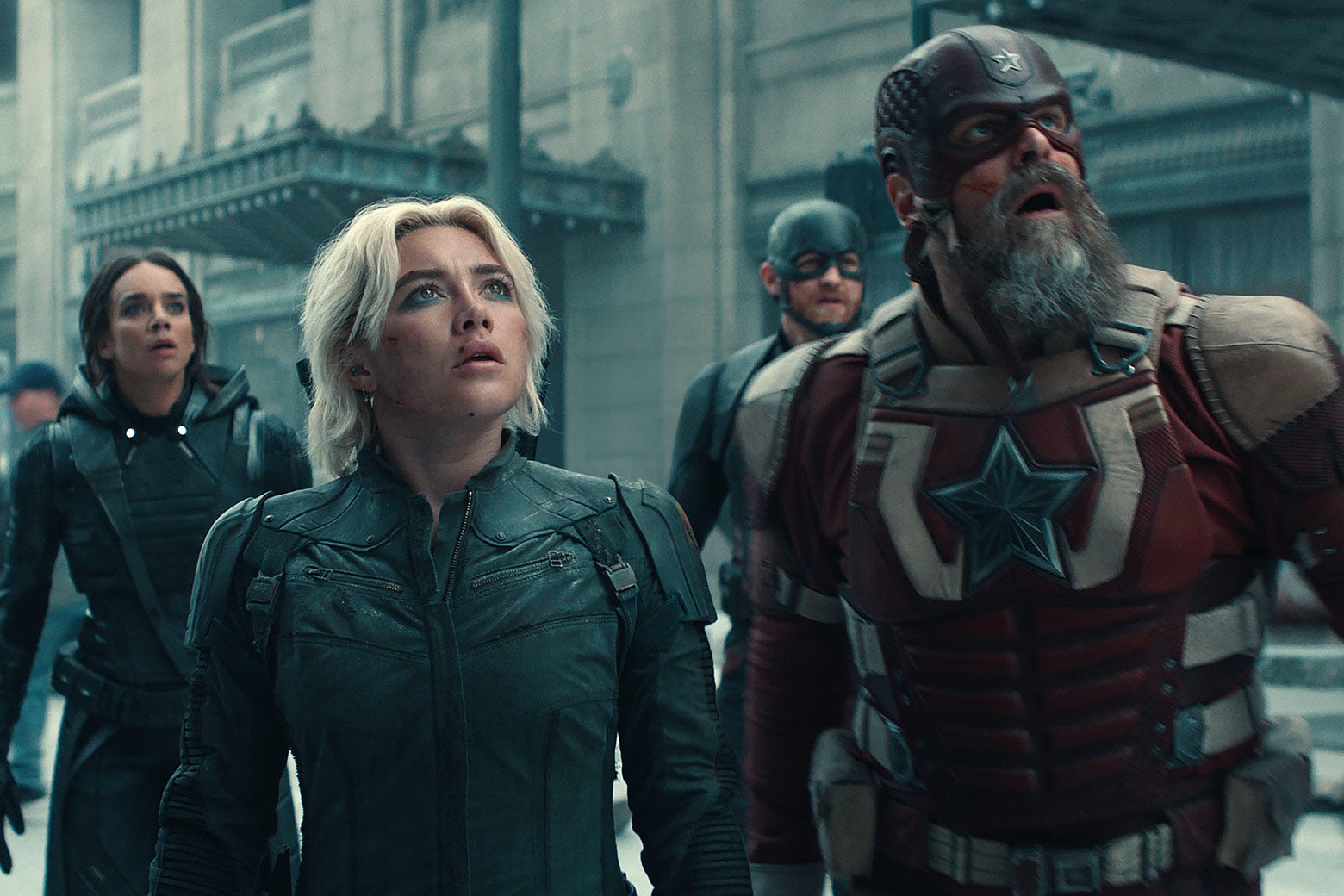Movies
The Twist That Makes Thunderbolts* Marvel’s Most Delightful Movie in Years
The new movie brings the franchise back down to earth. Thank God.

This article contains spoilers for Thunderbolts*.
Thunderbolts* is a Marvel movie in which almost nothing happens, and much the better for it. The asterisk in its title, a thorn in the side of copy editors everywhere, sets the stage for a momentous closing-credits reveal, but even that’s immediately undermined, as if the sense of significance can’t be allowed to continue for more than a minute or two. The group of second-string heroes we’ve been following through the movie—former Black Widow agent Yelena Belova (Florence Pugh), Bucky Barnes aka the Winter Soldier (Sebastian Stan), Alexei Shostakov aka the Red Guardian (David Harbour), John Walker aka U.S. Agent (Wyatt Russell), and Ava Starr aka Ghost (Hannah John-Kamen), along with a new arrival to the Marvel Cinematic Universe known mostly as Bob (Lewis Pullman)—has gelled into a moderately disciplined fighting force. With one notable exception, their powers aren’t especially super—Yelena complains, incredulously, “Do we all just punch and shoot?”—but there’s a void to be filled, especially when Julia Louis-Dreyfus’ slippery billionaire Valentina Allegra de Fontaine, now the head of the CIA, finds herself in a political jam. So, in a last-ditch effort to salvage her career, she announces that she’s reformed the Avengers, and the former mercenaries and contract killers who’ve spent most of the movie trying to put her behind bars are, much to their surprise, it.
Meet the New Avengers, very much not the same as the old ones. There are no Asgardian demigods in this bunch, no scientific geniuses or nationally beloved icons. It’s not even clear they’re allowed to call themselves that—in a postcredits scene, we’re informed that Sam Wilson, the new Captain America, is trying to legally prevent them from using the Avengers name, like a member of a classic-rock band fighting over who gets to tour as the Guess Who. There’s only one movie scheduled before next summer’s Avengers: Doomsday, and that one, The Fantastic Four: First Steps, looks to be set principally in a parallel universe, so it’s likely that the debate over who the real Avengers are will still be raging the next time whoever they are gets called to assemble. But the Thunderbolts, a name borrowed from the youth soccer team on which Yelena and her late sister, Natasha Romanoff (the original Black Widow), played as girls, hardly seem worthy of either name. They’re a replacement cast, not marquee players.
And yet, that’s what makes Thunderbolts*, if not exactly great, at least the most entertaining Marvel movie in years (although, to be frank, that’s not the highest bar to clear). Director Jake Schreier and co-writer Joanna Calo previously worked together on the Netflix series Beef, which makes them especially qualified for a movie that’s at least 50 percent bickering. The characters meet when Valentina, who has previously employed all of them in various extralegal capacities, sends each of them on a mission to kill one of the others, as a way of covering up her past before a congressional investigation unearths the truth. And although they quickly realize they’ve been set up and are better off joining forces against their common enemy, they never stop squabbling among themselves.
At worst, the Thunderbolts’ constant bickering has a strained, half-clever quality, as if the director simply yelled “and … Banter!” and let the cameras roll. I’m not one of the people who thinks Joss Whedon’s self-conscious quirk ruined genre screenwriting for a generation, but after the third or fourth time Yelena made a snarky comment about U.S. Agent’s helmet, I started to think that those people might have a point. Still, the movie features not only some of the best actors in the MCU, but some of the funniest. Pugh’s dry deadpan is deepened by her character’s borscht-thick Russian accent, and Louis-Dreyfus makes a splendid schemer, a spineless weasel with just enough power to be truly dangerous. It’s a movie that doesn’t mind devoting several minutes to a sequence in which the characters find themselves trapped at the bottom of a long underground shaft and have to press their bodies together, back to back, so they can inch their way to the surface, one quarreling step at a time.
All this team building pays off at the movie’s climax, when the fledgling supergroup finds itself saving Manhattan, once again, from destruction. (Surely other cities need saving sometimes?) Thanks to Valentina’s off-the-books experiments, Bob has been transformed into a Superman-level hero named Sentry, but she doesn’t know or doesn’t care that he’s mentally unstable, subject to bouts of severe depression that are amplified by his newly acquired powers. When he realizes that he’s become something close to a god, his dark side quite literally takes over, turning him into a charcoal-black effigy with golden pinpoints for eyes and a casual disregard for lower life forms—which, as far as he’s concerned, is all of them. He barely even notices as he trashes the former Avengers Tower, now Valentina’s half-renovated HQ, and sends debris plummeting toward the sidewalk outside Grand Central Station. But the Thunderbolts notice, and they spring into action.
By Marvel standards, the sequence that follows is almost comically low stakes. There are a bunch of innocent people walking around, and the heroes have to prevent them from getting flattened by flying pieces of skyscraper. But the movie treats those people as individuals, not as a computer-generated mass or a narrative abstraction. They’ve got lives and families, and they don’t deserve to be squished just because they happened to be walking down the wrong street at the wrong time. Marvel heroes are always pulling humanity back from the brink of annihilation, but neither the heroes nor the movies they’re in tend to have much use for actual humans. (The Spider-Man movies draw on a separate tradition more concerned with regular people—considering that a purse-snatcher beneath his notice had fatal consequences for the family of the young Peter Parker—but they’ve become increasingly cosmic as Tom Holland’s Spidey has been folded into the MCU.) Robert Downey Jr. ending the movie that launched the MCU by revealing Iron Man’s secret identity may have saved the series a lot of domestic gear-grinding, but it also permanently and irrevocably divorced it from anything resembling the world the movies’ audiences inhabit. It’s telling that the only original Avenger with a robust civilian life is Hawkeye, who’s too boring to merit his own movie.
The Thunderbolts, however, aren’t too far removed from being your typical schmoes. Rescuing random strangers isn’t something they do on the way to their big boss battle—it’s the essence of who they are. And it’s what, eventually, confirms that they’re a real team, not just a bunch of misfits thrown together by fate. As the debris rains down, a massive slab of concrete goes hurtling toward earth, and although Alexei is able to stop it from crushing a paralyzed little girl, it’s so big that it threatens to crush him instead. One by one, his teammates run to his aid, and eventually there’s just enough muscle between them to thrust the slab up and away.
That sequence is followed by a proper climax where the Thunderbolts manage to subdue the movie’s villain. But it’s not as moving as their wrestling with a massive chunk of rock. It’s teamwork at its essence and, notwithstanding the movie’s attempts at comic-book psychodrama, the most potent illustration of its underlying theme: that no one, no matter how alienated or off-center they may feel, is better off alone. Marvel’s heroes have saved the world and/or universe more times than you can count, but mostly they seem to be saving only themselves. Thunderbolts* treats ordinary people as if they’re the ones who matter, and superheroes are just there to keep them safe.
Get the best of culture
Get the best of movies, TV, books, music, and more.
-
Comics
-
Marvel
-
Superheroes











